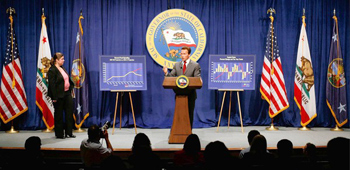It's the summer budget-brawling season in Sacramento, a time for regurgitating old myths and simplistic solutions.

As Finance Director Ana Matosantos looks on, Gov. Arnold Schwarzenegger calls for reductions in state spending that include closing down the state's main welfare program for a savings of $1.2 billion. (John G. Mabanglo, European Pressphoto / June 21, 2010)
One persistent myth about the perpetually bleeding state budget is that it's all the fault of public employee unions.
They are to blame for some things: bullying liberal allies they deem insufficiently subservient (Senate leader Darrell Steinberg [D-Sacramento] is the latest target); blocking reforms they feel threaten members (teacher unions are notorious); and driving up retirement benefits to unsustainable levels (CHP officers, prison guards and civil servants are all guilty).
But none of that really contributes to the $19-billion deficit projected for the state general fund.
Another myth is that California government can cut its way out of the hole. Sometimes when government cuts spending, it actually costs money.
In truth, California's budget nightmare stems from a devil's brew of sins: lack of discipline on both spending and tax-cutting in the past; an outdated and unreliable tax system too susceptible to economic booms and busts; the unhealthy dependence of local governments on Sacramento; and a dysfunctional state budgeting process that requires a gridlock-generating two-thirds majority vote.
Based on my e-mail, many people believe that the way for Sacramento to make ends meet is to cut state employees' salaries by, say, 10%. Well, in the last year, most have been cut by 14% through furloughs. And the state still has a $19-billion projected deficit.
For the fiscal year starting July 1, Gov. Arnold Schwarzenegger is proposing to cut salaries by 5%, require workers to contribute an additional 5% of pay to retirement and cut the workforce by 5%. That would save a mere $1.8 billion.
Even if Schwarzenegger could fire every state employee under his control - roughly 230,000 - it still wouldn't balance the books.
"Fire every prison guard, every CHP officer, everyone who works at the DMV, everyone who works for the state parks system ... and you're still not there," notes H.D. Palmer, spokesman for the state Finance Department.
That's because roughly 70% of the state general fund flows out to local governments and schools, one of the unintended consequences of Proposition 13, which slashed the property tax 32 years ago.
And those pension costs? The governor has budgeted $3.8 billion in state contributions for the next fiscal year. But only $2.1 billion of that would burden the bleeding $83-billion general fund. The rest would come from self-sustaining special funds.
So even if employee pensions didn't cost the state a cent - an impossibility - the savings would fill only 11% of the general fund deficit hole.
Pressured by politicians and a private sector with pension envy, four public employee unions last week reached agreement with the Schwarzenegger administration on some retirement rollbacks for future hires.
The unions represent about 10% of the governor's workforce, including firefighters, Highway Patrol officers, health and welfare personnel and psychiatric technicians.
The pacts return pensions for future employees to roughly the levels that existed before then-Gov. Gray Davis and the Democratic Legislature boosted benefits substantially in 1999. And that rollback is long overdue.
But the grand savings? All of $72 million a year. And only $43 million of that helps the general fund.
The state gain from the union agreements derives from increases in employee contributions, a workforce cut and one unpaid day off a month. The actual pension rollbacks will help future generations balance the state books, but they'll be of no use to current budget-writers.
The administration also is negotiating with other unions that represent most of the remaining employees. If the same deal is cut for all workers, it would hardly be a budget-balancer - filling only about 6% of the hole.
So lawmakers need to whack away at spending. But some cuts result in no savings or actually increase costs - if not for the state, for local governments.
If Schwarzenegger, for example, succeeds in his effort to close down the state's main welfare program - a $1.2-billion savings - that "clearly would have a significant impact on the counties," Palmer concedes.
That's because counties legally must provide the safety net of last resort for the poor with their general assistance programs. Dan Carson, deputy legislative analyst, estimates there'd be a cost shift to the counties of "at least $1 billion" if the Legislature accepted Schwarzenegger's proposal. Which it won't.
Schwarzenegger also is trying to cut spending on In-Home Supportive Services by $750 million. But that could force many frail, elderly people into much more expensive nursing homes. This would significantly jack up Medi-Cal costs.
The governor has proposed scrapping the state's adult day healthcare program to save $135 million. It serves mostly disabled, chronically ill or elderly poor, some with dementia. This could propel many into emergency room care or even nursing homes and wind up costing the state more.
"These are folks who are at risk and are right there on the edge," says Dr. Rafael Amezcua, medical director for AltaMed Health Services, a major provider under the program.
Palmer rationalizes: "We've got to close a $19-billion gap. And to do that without raising taxes, there's going to be some collateral effects."
Effects such as more misery for a lot of people - and maybe even higher costs for the state.
There's much denial about the true causes of California's fiscal fiasco. And until the real culprits are confronted, the Legislature will keep passing unbalanced, gimmicky budgets rooted in the rhetoric of myth.











